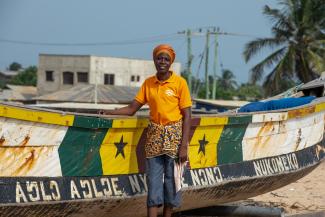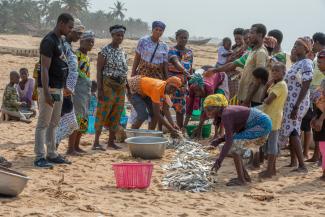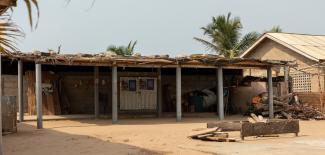
Under the dark orange pre-dawn sky, fifty-seven-year-old Bernice Dzanyekpo emerges from her home in Dzita, a fishing community in Ghana’s Volta Region.
She makes her way through the cold sea breeze to the beach, anticipating the fishermen’s return from sea

Yooku Ata-Bedu
Bernice has been in the fishing business for over 40 years, supplying fresh and processed fish and other seafood. She learned her trade from her mother and grandmother who would purchase and process produce from fishermen. They would smoke, dry, or salt it before sale.
When Bernice took over the family business, she wanted to expand. Realizing that fishermen made a significant profit from their catch, she bought a canoe and fishing gear.
“Now I facilitate fishing expeditions. When the fishermen return from sea, I own the catch. We sell some and I process the rest before sale” she explains.
As the business steadily grew, Bernice saw more opportunities to grow her client base. She wanted to reach seafood lovers across the country through supermarkets, restaurants, and hotels, but she didn’t know where to start. When she heard that the USAID-supported Feed The Future Ghana Fisheries Recovery Activity would train fisherfolk on how to improve the quality of their produce to meet regulatory standards and access larger markets, she enrolled to participate.
Through the activity, Bernice and other fishing industry operators learned about safe fish processing techniques, including how to build environmentally friendly stoves for smoking, how to dry shrimp and other seafood in hygienic conditions, and how to ensure the processing and preservation of fish was free from harmful toxins.

Yooku Ata-Bedu

The new processing facility for Madam Fish Company which is Safe Fish Certification compliant
Yooku Ata-Bedu
“With my certification, I am now recognized by numerous hospitality establishments in the capital, Accra, and other parts of the country because they can trust the fish we supply to them. I also participate in the National Fish Festivals,” she exclaims.
Today, Bernice sells fresh and processed seafood to customers near and far. Her products are weighed, packaged and labeled in compliance with best practice, and stamped with a Ghana Standards Authority symbol of quality.
This expansion has allowed her to hire and train six new staff members. She has also started training other fish processors, through the Safe Fish Certification programme, on how to establish processing facilities that meet safety standards. Bernice and her Madam Fish Company have received widespread recognition—she has received awards on three separate occasions during the Regional Farmers’ Day Celebration.
“With my certification, I am now recognized by numerous hospitality establishments in the capital, Accra, and other parts of the country because they can trust the fish we supply to them. I also participate in the National Fish Festivals,”

Yooku Ata-Bedu
Alice and Bernice - Fourth and Third Generation
“My business has improved greatly and I can see the results,” she says. She is continuing the family tradition and works closely with her daughter, Alice, who is in line to take over the business. The mother-daughter duo plans to break into the international market and is exploring various packaging options that can withstand international travel and meet international quality standards.
Context
From 2021 to 2024 the Feed the Future Ghana Fisheries Recovery Activity (GFRA), partnered with the Fisheries Commission, Food and Drugs Authority, Ghana Standards Authority, and others to:
Develop a framework for Safe Fish Certification and Licensing
Train 700 fisherfolk (mainly women), from the Volta, Central, Greater Accra and Western Regions on hygienic fish handling and processing, financial literacy and entrepreneurship.
Collaborate with 150 certified processing facilities to improve their processing practices.
Story and photos by Yooku Ata-Bedu and Atiewin Mbillah-Lawson for USAID/Ghana

